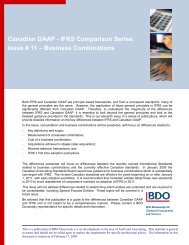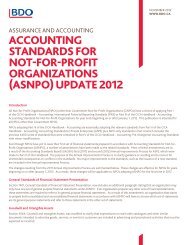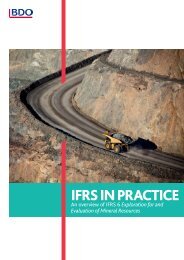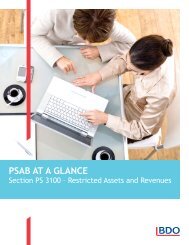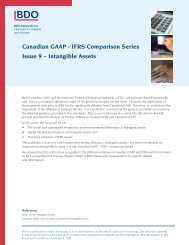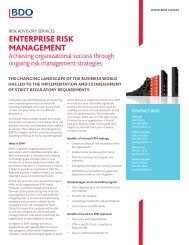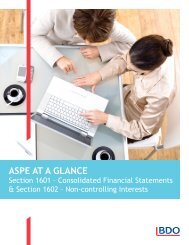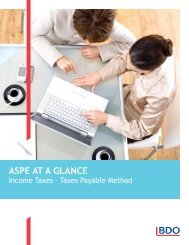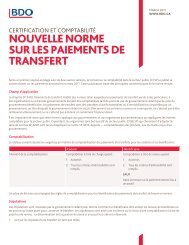Need to Know: IFRS 10 - Consolidated Financial ... - BDO Canada
Need to Know: IFRS 10 - Consolidated Financial ... - BDO Canada
Need to Know: IFRS 10 - Consolidated Financial ... - BDO Canada
- No tags were found...
Create successful ePaper yourself
Turn your PDF publications into a flip-book with our unique Google optimized e-Paper software.
18 <strong>IFRS</strong> <strong>10</strong> <strong>Consolidated</strong> <strong>Financial</strong> Statements7.3.4. Substantive rightsOnly substantive rights are considered when power is assessed. In order for a right <strong>to</strong> be substantive, the holder musthave the practical ability <strong>to</strong> exercise the right. The standard requires that substantive rights held both by the inves<strong>to</strong>rand by others are assessed (<strong>IFRS</strong> <strong>10</strong>.B22).<strong>IFRS</strong> <strong>10</strong> acknowledges the assessment of whether rights are substantive requires judgment. It provides examples offac<strong>to</strong>rs that need <strong>to</strong> be considered, split in<strong>to</strong> the headings ‘barriers <strong>to</strong> exercise’, ‘agreement of other parties required’and ‘exercise benefits right holder’ (<strong>IFRS</strong> <strong>10</strong>.B23).Barriers <strong>to</strong> exerciseThe existence of any barriers (economic or otherwise) that prevent the holder from exercising the rights are required<strong>to</strong> be considered. Examples of such barriers include but are not limited <strong>to</strong> (<strong>IFRS</strong> <strong>10</strong>.B23):––<strong>Financial</strong> penalties and incentives––An exercise or conversion price that creates a financial barrier (for example, the exercise price of options that wouldgive the holder sufficient voting rights <strong>to</strong> obtain control of an entity may be deeply out of the money and thereforeuneconomic <strong>to</strong> exercise – see section 7.3.8)––Terms and conditions that make it unlikely that the right is exercised (e.g. a condition that sets a very narrow limit<strong>to</strong> the timing of exercise)––The absence of an explicit, reasonable mechanism <strong>to</strong> allow the holder <strong>to</strong> exercise its rights (this might link <strong>to</strong> thefounding documents of an investee, or applicable laws and regulations)––An inability for the holder <strong>to</strong> obtain the information necessary <strong>to</strong> exercise its rights––Operational barriers or incentives (e.g. in circumstances where there is a manager of an entity, the absence of othermanagers willing or able <strong>to</strong> provide specialised services or provide the services and take on other interests held bythe incumbent manager)––Legal or regula<strong>to</strong>ry requirements (e.g. where a foreign inves<strong>to</strong>r is prohibited from exercising its rights).Agreement of other parties requiredWhen exercising a right requires the agreement of more than one party, the following fac<strong>to</strong>rs should be considered:––Whether a mechanism is in place that provides the parties with the practical ability <strong>to</strong> exercise the right. Theabsence of such a mechanism would indicate that the rights may not be substantive––The number of parties that have <strong>to</strong> agree on the exercise of the rights. The more parties that are required <strong>to</strong> agree<strong>to</strong> the exercise of the rights, the less likely it is that those rights are substantive––Removal rights exercisable by an independent board of direc<strong>to</strong>rs are more likely <strong>to</strong> be substantive than if the samerights were exercisable individually by a large number of inves<strong>to</strong>rs.Exercise benefits right holderThere is a further question of whether the party holding the right would benefit from its exercise. For example, forpotential voting rights, the terms and conditions are more likely <strong>to</strong> be substantive when the instrument is in themoney, or the holder would benefit in other ways (for example, from realising synergies).To be substantive, rights also need <strong>to</strong> be exercisable when decisions about the relevant activities are made. This willalways be the case when rights are currently exercisable. However, a right can also be substantive if it is not currentlyexercisable but is exercisable when the relevant activities are made.




